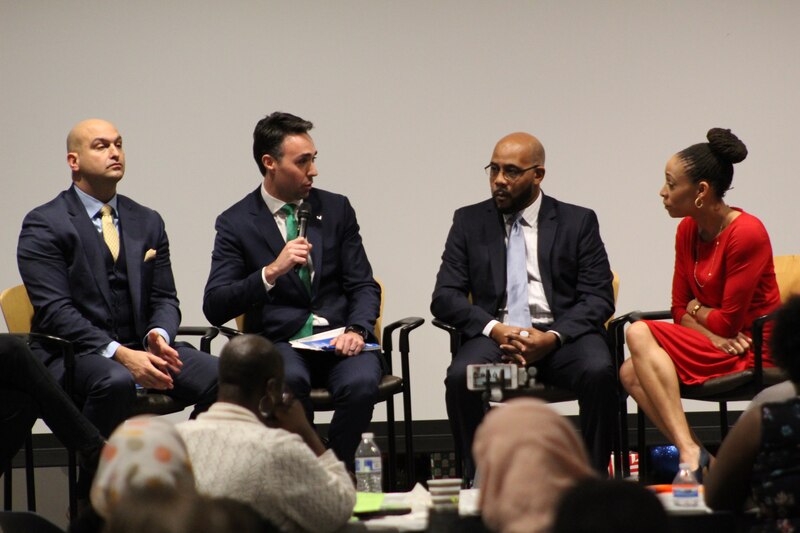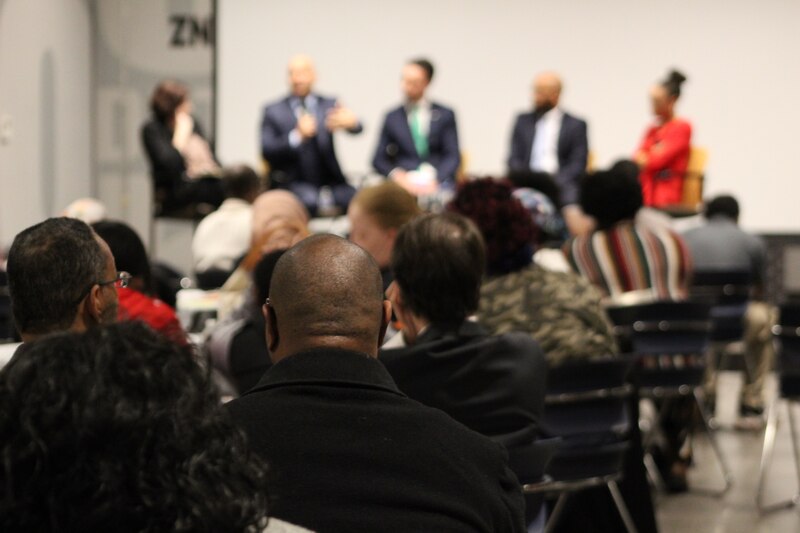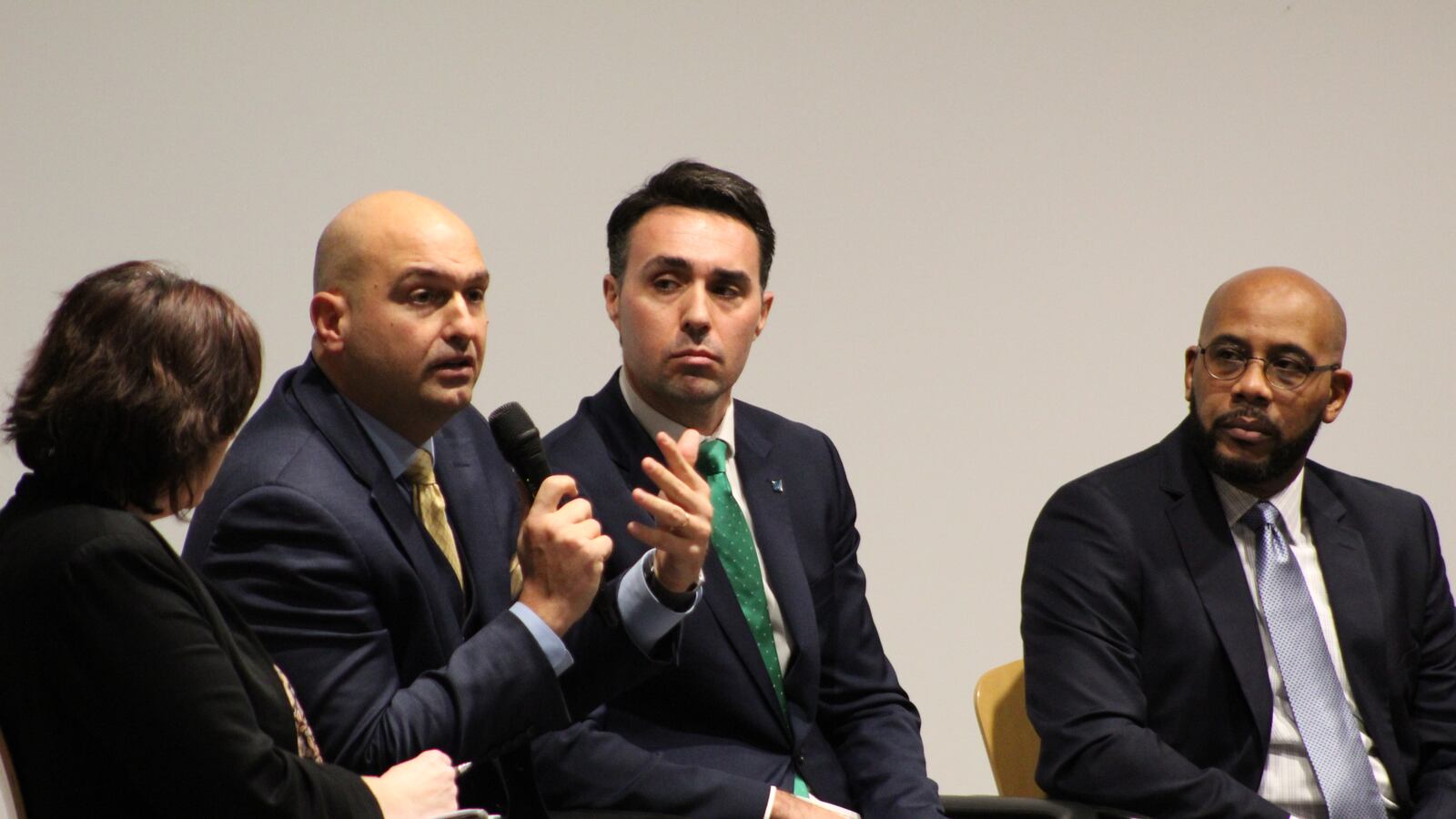A simple question about lobbying lawmakers for equitable school funding produced a standout moment in an otherwise civil discussion about the state of schools in Detroit.
“We don’t get involved in those conversations,” said Rob Kimball, associate vice president of charter schools at Grand Valley State University. “It’s typically not what we do.”
His remark — during the second annual State of the Schools event Thursday night — elicited murmurs from some of the 250 people in the audience. Nikolai Vitti, superintendent of the Detroit district, didn’t let Kimball’s statement go without a heated response. (Watch the video here).
“How are we not talking about a legislative advocacy for children to have equal funding?” Vitti asked, producing a round of applause from the audience. “I just don’t understand that.” Vitti added that it shouldn’t matter whether the discussion is about a charter school or a traditional public school.
School funding in Michigan has been a hot topic this year as lawmakers have been pushed to fix The the formula for funding schools and make it it fair and equitable for all students. Currently, a wide gap exists between the lowest-funded districts and the highest, and there have been increased calls to allocate more money for students with bigger needs. That includes students from low-income homes, students still learning English, and students with special education needs.
“I’m deeply bothered that even when the charter organizations have friends in Lansing, that’s not leveraged as a way to create equity in Detroit,” Vitti said. “That just doesn’t make sense.”
Kimball, who also chairs the Michigan Council of Charter School Authorizers, which works to support authorizers in the state, reiterated his point when the event was over.
“We’re not a lobbying organization,” Kimball said.
Later, though, Grand Valley’s charter school office mentioned the equity discussion in a tweet.
“We agree on the importance of equity for every child, and look forward to working more — together — to attain it,” the tweet said.
The event was sponsored by the community organization 482Forward and was designed to allow the community to hear about how schools are faring in the city. Grand Valley authorizes 29 charter schools in Detroit — the largest of any authorizer.

Vitti, Kimball, and Edwynn Bell, the principal of Detroit Collegiate High School, answered questions from journalists during the first half of the forum, then answered questions submitted on paper from members of the audience.
Earlier in the event, the issue of funding had come up, and Kimball addressed the question of equity. He noted that charter schools can’t ask local taxpayers to fund their facilities.
“All charter schools in the state of Michigan have to live off their state per-pupil allocation,” Kimball said. “It’s hard to reconcile that inequity.”
Vitti, meanwhile, talked at length about the need for a weighted formula that takes into account the cost of educating a student.
“To truly make public education a vehicle for social change and social transformation, and to really give this generation a better opportunity than the generation before them, you have to fund it appropriately,” Vitti said. “It has to be diversified and differentiated based on need.”
Such a weighted funding formula was called for in a sweeping report issued earlier this year by a diverse group of business, education, and community officials. It’s also something governor-elect Gretchen Whitmer called for during her campaign. Whitmer appeared in a video that played at the beginning of the forum, and she again noted the need for a weighted funding formula, saying it would allow students to have “the type of wraparound supports they need to be successful.”
The forum addressed a number of other issues, such as class sizes, gangs and bullying, and the state’s third-grade reading law, which will require schools to hold back students who aren’t reading at grade level by the end of third grade. That retention mandate doesn’t kick in until after the 2019-20 school year. The panelists discussed the need to start tackling that issue now.
But Vitti offered a sobering reality.
“On the surface, I believe everyone should be afraid. If you look at just statistics … roughly 90% of third-graders would be retained.”
He noted that some students will be exempted from the rules. And the true number of students who will need to be held back won’t be known until the state education department defines what it means to be reading at grade level on state exams.
Vitti said the district is doing all it can to help students, from hosting family literacy nights to launching a community-based effort that will bring volunteers in to help tutor students in phonics.
“We’re going to do everything we can in DPSCD to not retain children,” Vitti said.


